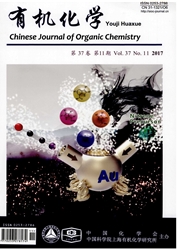

 中文摘要:
中文摘要:
为寻找抗肿瘤作用强、毒性低并且对癌细胞具有靶向性的新葸醌类化合物,合成了未见报道的12个2-[1-(4-甲酰氨苯基乙酰氧)烷基]-1,4-二羟基-9,10-葸醌类衍生物,分别用L1210癌细胞进行细胞毒性实验及小鼠s180腹水癌做了体内抗肿瘤实验.实验结果表明,蒽醌侧链中引入对甲酰氨基苯乙酰基后细胞毒性增强.随着侧链碳链数的增加细胞毒性随之逐渐减小,当烷基侧链中的碳数超过7以上时,细胞毒性消失.当侧链R基为苯环时与脂肪烃链或环己基相比细胞毒性更大,说明芳香环对癌细胞具有更强的抑制作用.S180小鼠抗肿瘤实验结果表明,蒽醌侧链中引入对甲酰氨基苯甲酰基后活性无显著性变化.
 英文摘要:
英文摘要:
In order to increase anthraquinone antitumor activity and affinity to DNA and reduce the toxicity, a series of 2-{1-[(4-formamidophenyl)acetoxy]alkyl}-1,4-dihydroxyl-9,10-anthraquinones were synthesized and their cytotoxicity against L1210 cancer cells and antitumor activity against ICR mice bearing sarcoma S 180 cells were evaluated. The results showed that the introduction of 4-formamidophenylacetyl to the anthraquinone side chain increased their cytotoxicity, and the alkyl chain length at C(2)-C(6) showed moderate cytotoxicity. While the elongation of alkyl group over 7 carbon atoms failed to enhance the cytotoxicity, however different antitumor activity could not be observed in mice bearing S180 cell in vivo experiment. The compounds with the side chain substituted with a benzyl group showed the highest cytotoxic activity and antitumor activity.
 同期刊论文项目
同期刊论文项目
 同项目期刊论文
同项目期刊论文
 期刊信息
期刊信息
